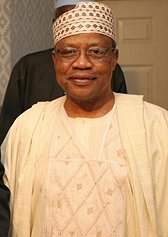
Back Ibrahim Babangida Afrikaans إبراهيم بابنجيدا Arabic ابراهيم بابنجيدا ARZ Ibrahim Babangida AST Ibrahim Babangida Breton Ibrahim Babangida Catalan Ibrahim Babangida German Ibrahim Babangida Esperanto Ibrahim Babangida Spanish Ibrahim Babangida Basque
Ibrahim Babangida | |
|---|---|
 Babangida in 2010 | |
| 8th President of Nigeria | |
| In office 27 August 1985 – 26 August 1993 | |
| Vice President |
|
| Preceded by | Muhammadu Buhari as Military Head of State of Nigeria |
| Succeeded by | Ernest Shonekan as Interim Head of State of Nigeria |
| Chief of Army Staff | |
| In office 1 January 1984 – 26 August 1985 | |
| Preceded by | Mohammed Inuwa Wushishi |
| Succeeded by | Sani Abacha |
| Personal details | |
| Born | 17 August 1941 Minna, Northern Region, British Nigeria (now in Niger State, Nigeria) |
| Political party | Peoples Democratic Party |
| Spouse | |
| Children | 4, including Mohammed |
| Alma mater | Royal Armoured Centre |
| Occupation |
|
| Military service | |
| Allegiance | |
| Branch/service | |
| Years of service | 1962–1993 |
| Rank | |
| Battles/wars | Nigerian Civil War |
Ibrahim Badamasi Babangida GCFR GCB (born 17 August 1941) is a Nigerian statesman and military dictator who ruled as military president of Nigeria from 1985 when he orchestrated a coup d'état against his military and political arch-rival Muhammadu Buhari, until his resignation in 1993[1] as a result of the post-12 June 1993 election which he illegally nullified.[2]
He rose through the ranks of the Nigerian Army fighting in the Nigerian Civil War and at various times being involved in almost all the military coups in Nigeria, before advancing to the full-rank of a General and ultimately as Commander-in-Chief of the Armed Forces; and as an unelected President and military dictator from 1985 to 1993, ruling for an uninterrupted period of eight years. His years in power, colloquially known as the Babangida Era,[3] are considered one of the most controversial in Nigerian political and military history, being characterized by a burgeoning political culture of corruption in Nigeria,[4] with Babangida and his regime estimated to have appropriated at least 12 billion dollars (23.9 billion today).[5]
The Babangida regime oversaw the establishment of a state security apparatus; survived two coup d'ètat attempts and the subsequent execution of Mamman Vatsa (1985) and Gideon Orkar (1991) alongside the trial of hundreds of soldiers; assassination in Lagos of Dele Giwa (1986).[6] The regime also faced a series of ethnic and religious outbreaks related to the fallout of Babangida's decision to increase cooperation with the Muslim world and rise in extremist tendencies. On the continent, his rule projected the country as a regional power with diplomatic successes including the Abuja Treaty and the military engagement of Nigerian troops in Liberia and Sierra Leone.
Abroad, Babangida's military regime cemented traditional relations with the English-speaking world of the United States and the United Kingdom; and implemented economic liberalization and the privatization of state-owned enterprises alongside a national mass mobilization. The fall of Babangida and his regime was precipitated by the transition toward the Third Nigerian Republic and the subsequent militarization of politics in the 1993 presidential election which he annulled.
- ^ "Nigerian Military Dictator Steps Down, Installs Interim Regime". Los Angeles Times. 27 August 1993. Retrieved 4 July 2024.
- ^ Ogundairo, Abiodun (24 June 2020). "How IBB annulled the June 24, 1993 presidential election". GuardianTV. Retrieved 4 July 2024.[permanent dead link]
- ^ Cite error: The named reference
Salami 81was invoked but never defined (see the help page). - ^ Diamond, Larry; Kirk-Greene, Anthony; Oyeleye Oyediran (1997) Transition without End: Nigerian Politics and Civil Society Under Babangida, Vantage Publishers, ISBN 978-2458-54-6.
- ^ Nsehe, Mfonobong (8 November 2011). "Who Were Africa's Richest Dictators?". Forbes.
- ^ "Remembering Dele Giwa, Nigeria's hero of journalism 34 years after". The Guardian. 19 October 2020. Retrieved 13 March 2022.